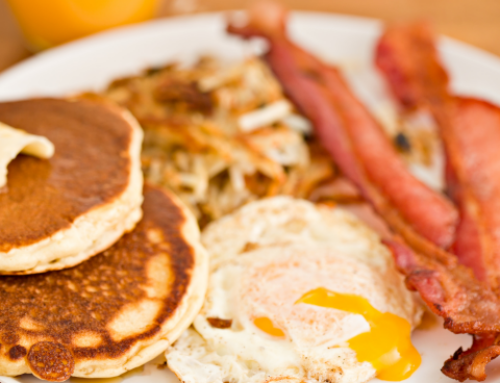The Value of Protein for Athletes
Protein’s Place in Your Diet
Protein provides amino acids, which muscles need to rebuild, recover and gain size and strength. Consuming too little protein inhibits muscle growth, repair and recovery, which in turn affects strength, power and endurance.
How to Calculate Your Protein Needs
Weight (lbs) x (0.36) = grams of protein needed daily to maintain
Weight (lbs) x (0.68) = grams of protein needed daily to build muscle
Protein-Packed Foods
You can meet your protein needs with five or six small meals,beach containing 20 to 30 grams of protein. Great sources are dairy products such as milk (8g in one cup); lean meats and fish (20g in 3 oz.); and chicken (27g in 4 oz.).
Supplementation
Before taking in more protein through supplements, first educate yourself on your dietary needs. If you have a balanced diet but a deficiency still exists, or if you need to jumpstart strength gains, a whey protein shake with 20 to 30 grams of protein within 30 minutes post-workout can be very effective. During this period, muscles are primed to rebuild and recover. New research suggests that consuming another 20 grams of high-quality protein two hours following a workout optimizes muscle size and gains. (See page 18 for more on whey protein.)
Watch video with sports nutritionist Lisa Dorfman about how supplmentation can help in an athlete’s diet.
How Too Much Protein Affects the Body
There’s a limit to the amount of protein your body can process and use. If protein intake exceeds carbohydrate intake, the body begins to use protein as a source of energy. This produces toxins called ketones, which place unneeded strain on the organs and can cause dehydration (and even bad breath).
Check out five portable protein-packed foods below.
Beef Jerky (1 oz)
Delivers 13 grams of protein per serving, plus it’s high in sodium, an especially critical electrolyte for maintaining fluid balance.
Hard-boiled Eggs (3)
Your body absorbs animal proteins, like those found in eggs, better than plant proteins. Add three to your diet for 18 grams of quick, muscle-building protein.
Chunk Light Tuna in Water (2.6 oz pouch)
A single serving has just 60 calories but packs 18 grams of protein.
Peanut Butter (8 oz)
Two tablespoons contain 190 calories, 16 grams of healthy fat and 8 grams of protein.
Almonds (1/4 C)
A serving provides approximately 7 grams of protein and 15 grams of healthy fats, along with a high dose of antioxidants, which help protect muscles against stress from intense activity.
RECOMMENDED FOR YOU
The Value of Protein for Athletes
Protein’s Place in Your Diet
Protein provides amino acids, which muscles need to rebuild, recover and gain size and strength. Consuming too little protein inhibits muscle growth, repair and recovery, which in turn affects strength, power and endurance.
How to Calculate Your Protein Needs
Weight (lbs) x (0.36) = grams of protein needed daily to maintain
Weight (lbs) x (0.68) = grams of protein needed daily to build muscle
Protein-Packed Foods
You can meet your protein needs with five or six small meals,beach containing 20 to 30 grams of protein. Great sources are dairy products such as milk (8g in one cup); lean meats and fish (20g in 3 oz.); and chicken (27g in 4 oz.).
Supplementation
Before taking in more protein through supplements, first educate yourself on your dietary needs. If you have a balanced diet but a deficiency still exists, or if you need to jumpstart strength gains, a whey protein shake with 20 to 30 grams of protein within 30 minutes post-workout can be very effective. During this period, muscles are primed to rebuild and recover. New research suggests that consuming another 20 grams of high-quality protein two hours following a workout optimizes muscle size and gains. (See page 18 for more on whey protein.)
Watch video with sports nutritionist Lisa Dorfman about how supplmentation can help in an athlete’s diet.
How Too Much Protein Affects the Body
There’s a limit to the amount of protein your body can process and use. If protein intake exceeds carbohydrate intake, the body begins to use protein as a source of energy. This produces toxins called ketones, which place unneeded strain on the organs and can cause dehydration (and even bad breath).
Check out five portable protein-packed foods below.
Beef Jerky (1 oz)
Delivers 13 grams of protein per serving, plus it’s high in sodium, an especially critical electrolyte for maintaining fluid balance.
Hard-boiled Eggs (3)
Your body absorbs animal proteins, like those found in eggs, better than plant proteins. Add three to your diet for 18 grams of quick, muscle-building protein.
Chunk Light Tuna in Water (2.6 oz pouch)
A single serving has just 60 calories but packs 18 grams of protein.
Peanut Butter (8 oz)
Two tablespoons contain 190 calories, 16 grams of healthy fat and 8 grams of protein.
Almonds (1/4 C)
A serving provides approximately 7 grams of protein and 15 grams of healthy fats, along with a high dose of antioxidants, which help protect muscles against stress from intense activity.











